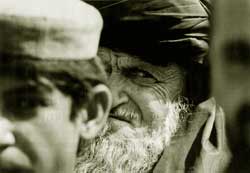 A friend who works in Afghanistan was visiting his parents' hometown of Macon, Georgia in the southern United States. This is deep south, Scarlett O'Hara country, where the American Civil War seems a living memory and people are proud that things don't change too much. So my friend was deeply shocked to see two men walking along the main street, bearded, turbaned and dressed in the distinctive shalwar kameez of the Northwest Frontier Province in Pakistan.
A friend who works in Afghanistan was visiting his parents' hometown of Macon, Georgia in the southern United States. This is deep south, Scarlett O'Hara country, where the American Civil War seems a living memory and people are proud that things don't change too much. So my friend was deeply shocked to see two men walking along the main street, bearded, turbaned and dressed in the distinctive shalwar kameez of the Northwest Frontier Province in Pakistan. He crossed over to their side of the street and hailed them in Pushto and was rewarded by broad grins breaking through bristling beards. After the usual litany of greetings and polite questions about health, family and mutual acquaintances, my friend sought the story of the two strangers. It turned out that they were members of the Muslim revival group, Tabligh-i-Jamaat, visiting Macon to see the sole Pakistani family in town and encourage them to keep up their Islamic faith and culture. Every year, the members of the group go on missions to isolated Muslims to offer spiritual support.

I use the word "mission" deliberately because Tabligh-i-Jamaat is a missionary organisation, mainly working among existing Muslims. The only Muslims I ever met who tried to convert me-and they tried relentlessly-were the now departed Taleban of Afghanistan. You could always tell a Taleb from similarly bearded and armed mujahideen counterpart by his missionary zeal. I even met a few westerners who bought into the Taleban line and became Muslims, although I think the lure of fighting and AK47s impressed such people as much the austere tenets of Islam. Just ask John Walker Lindh.
All over the world, the major faiths are pursuing missionary activities, based on the Christian concept. Even Hinduism. In Indian tribal areas like Bastar, the Ramakrishna Mission and other organisations proselytise and educate local indigenous communities. The largely Bengali Brahmin monks who do this are the Jesuits of Hinduism, widely-read and with acutely honed powers of reason and argument. They justify their activities by pointing to the massive inroads that fundamentalist Protestant Christian churches are making among India's marginalised groups-dalits, indigenous tribals and others. "They were once Hindus," a soft-spoken monk told me a few years ago, "and we just have to reacquaint them with their faith."
But the Ramakrishna Mission, the Tabligh-i-Jamaat and their counterparts in Sikhism and Sri Lankan Buddhism are small fry compared to the Christians. So too are the traditional Christian churches-Catholics, Lutherans, Anglicans-when compared to the hard-line Protestants and Evangelicals who are the driving force behind modern missionary work. The third largest amount of space on the web, behind pornography and gambling, is taken up by religious information. Consider, for example, the Unreached Peoples' Prayer site (www.bethany.com) where among links to thousands of non-Christian cultures I found a reference to the "Hindi" tribe of north India. It seems that these poor souls, according to the website, spend their days in mud huts, surrounded by idols and eating "Mulligatawny soup", their main staple. I didn't read much more but it's obvious that much spurious information is peddled as, well, gospel about everyone else on the site, from the Ainu of Japan to the Zoroastrians of Persia.
A so-called "university" in South Carolina pumps out graduates in Arabic and Koranic studies whose sole purpose in life is to convert Muslims to Christianity. In a recent magazine article, the director of the school admitted that maybe, just maybe, this sort of activity could lead to misunderstandings between cultures. The Jehovahs' Witness cult in South Asia targets existing Christians in India and Pakistan, seeking to lead them away from Catholicism or gentle Protestantism. The Jehovahs are extremely active in the Bhutanese refugee camps of Jhapa and Morang.
I'm not against people talking about their religion to those of other faiths, nor do I condemn missionaries as such. Without the Jesuits and many other Roman Catholic orders, a lot of South Asians might have missed out on a first class education. The United Mission to Nepal has long done sterling medical work here. But the tone of the times is changing and the zealots are slowly asserting themselves. Those of us who believe in tolerance, religious freedom and multiculturalism need to acquire a little missionary zeal of our own. Not to mention a link on the Unreached peoples' prayer profile web site.



